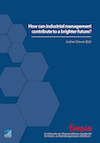Search


Bibtex
Cite as text
@Inbook{Gaal+Dummer+Sobottka+Ansari+Schlund,
Cite-key = "Gaal2023WGAB",
Year= "2023",
Volume= "Schriftenreihe der Wissenschaftlichen Gesellschaft für Arbeits- und Betriebsorganisation (WGAB) e. V.",
Pages= "115-134",
Journal = "WGAB",
Title= "Advancing Medical Resident Scheduling",
Author= "Alexander Gaal (1), Wolfgang Dummer (1), Thomas Sobottka(1, 2), Fazel Ansari (1, 2), Sebastian Schlund (1, 2);
(1) Fraunhofer Austria Research GmbH; (2) Vienna University of Technology",
Doi= "https://doi.org/10.30844/wgab_2023_7",
Abstract= "A Residency Scheduling Problem (RSP) is a tactical scheduling problem that assigns residents to specific training modules and hospitals to ensure adequate training over a 4-6 year planning horizon to acquire the postulated medical skills. There are currently about 8000 residents in training in Austria, and each hospital has several people involved in resident scheduling. These include the curriculum manager, the planners, the doctors and the human resources departments, who manually assign the residents to the individual training modules on a monthly basis, taking into account the numerous requirements of various stakeholders. Some of these requirements relate to elements of fairness, such as the number of months without training, violated preferences and hospital changes, which should be equally balanced across all residents. The goal is to find a feasible schedule for the residents that satisfies all the requirements, taking into account the trade-offs between the technical feasibility (hospital and legal requirements) of the rotation schedule, the ethical social aspects (fairness and equity), and the achievable quality of education (fulfilling preferences, uninterrupted education). This paper considers a real RSP and proposes a hybrid problem-solving approach consisting of a rule-based heuristic and an evolution-based metaheuristic. The heuristic corresponds to the actual planning logic used in hospitals and has been translated into a set of rules. A test dataset with almost 100 trainees is used for development and evaluation. The results show that the approach can produce (near) optimal solutions in a short time. A comparison with the currently used manual approach shows significant improvements and advantages. In further developments, an evaluation with real data sets from several hospitals is planned.",
Keywords= "residency scheduling, genetic algorithm, resource planning, hospital management",
}
Alexander Gaal (1), Wolfgang Dummer (1), Thomas Sobottka(1, 2), Fazel Ansari (1, 2), Sebastian Schlund (1, 2);
(1) Fraunhofer Austria Research GmbH; (2) Vienna University of Technology(2023): Advancing Medical Resident Scheduling. Schriftenreihe der Wissenschaftlichen Gesellschaft für Arbeits- und Betriebsorganisation (WGAB) e. V.(2023), S. 115-134. Online: https://doi.org/10.30844/wgab_2023_7 (Abgerufen 21.10.24)
Open Access
Abstract
Abstract
A Residency Scheduling Problem (RSP) is a tactical scheduling problem that assigns residents to specific training modules and hospitals to ensure adequate training over a 4-6 year planning horizon to acquire the postulated medical skills. There are currently about 8000 residents in training in Austria, and each hospital has several people involved in resident scheduling. These include the curriculum manager, the planners, the doctors and the human resources departments, who manually assign the residents to the individual training modules on a monthly basis, taking into account the numerous requirements of various stakeholders. Some of these requirements relate to elements of fairness, such as the number of months without training, violated preferences and hospital changes, which should be equally balanced across all residents. The goal is to find a feasible schedule for the residents that satisfies all the requirements, taking into account the trade-offs between the technical feasibility (hospital and legal requirements) of the rotation schedule, the ethical social aspects (fairness and equity), and the achievable quality of education (fulfilling preferences, uninterrupted education). This paper considers a real RSP and proposes a hybrid problem-solving approach consisting of a rule-based heuristic and an evolution-based metaheuristic. The heuristic corresponds to the actual planning logic used in hospitals and has been translated into a set of rules. A test dataset with almost 100 trainees is used for development and evaluation. The results show that the approach can produce (near) optimal solutions in a short time. A comparison with the currently used manual approach shows significant improvements and advantages. In further developments, an evaluation with real data sets from several hospitals is planned.
Keywords
Schlüsselwörter
residency scheduling, genetic algorithm, resource planning, hospital management

 English
English